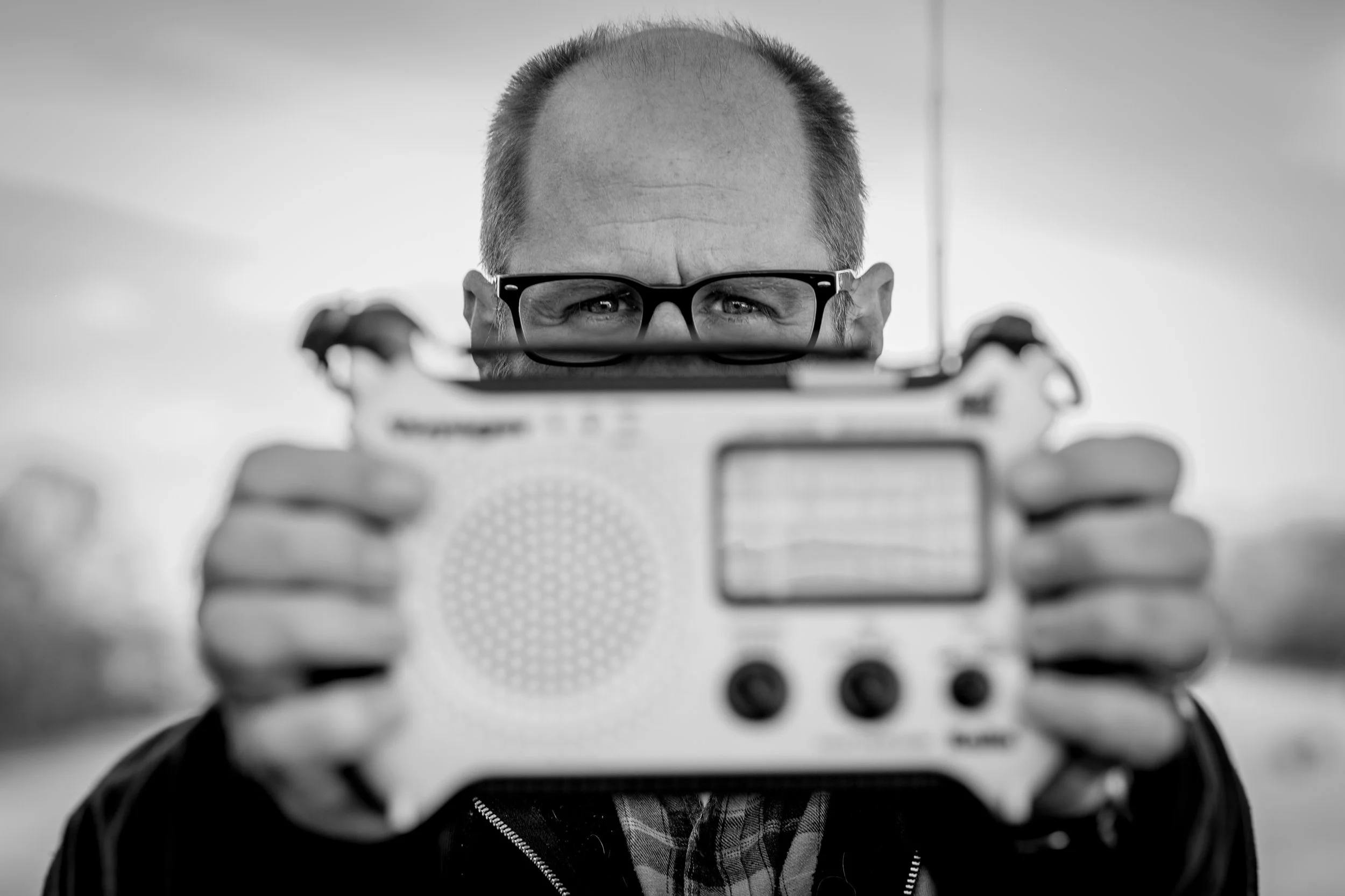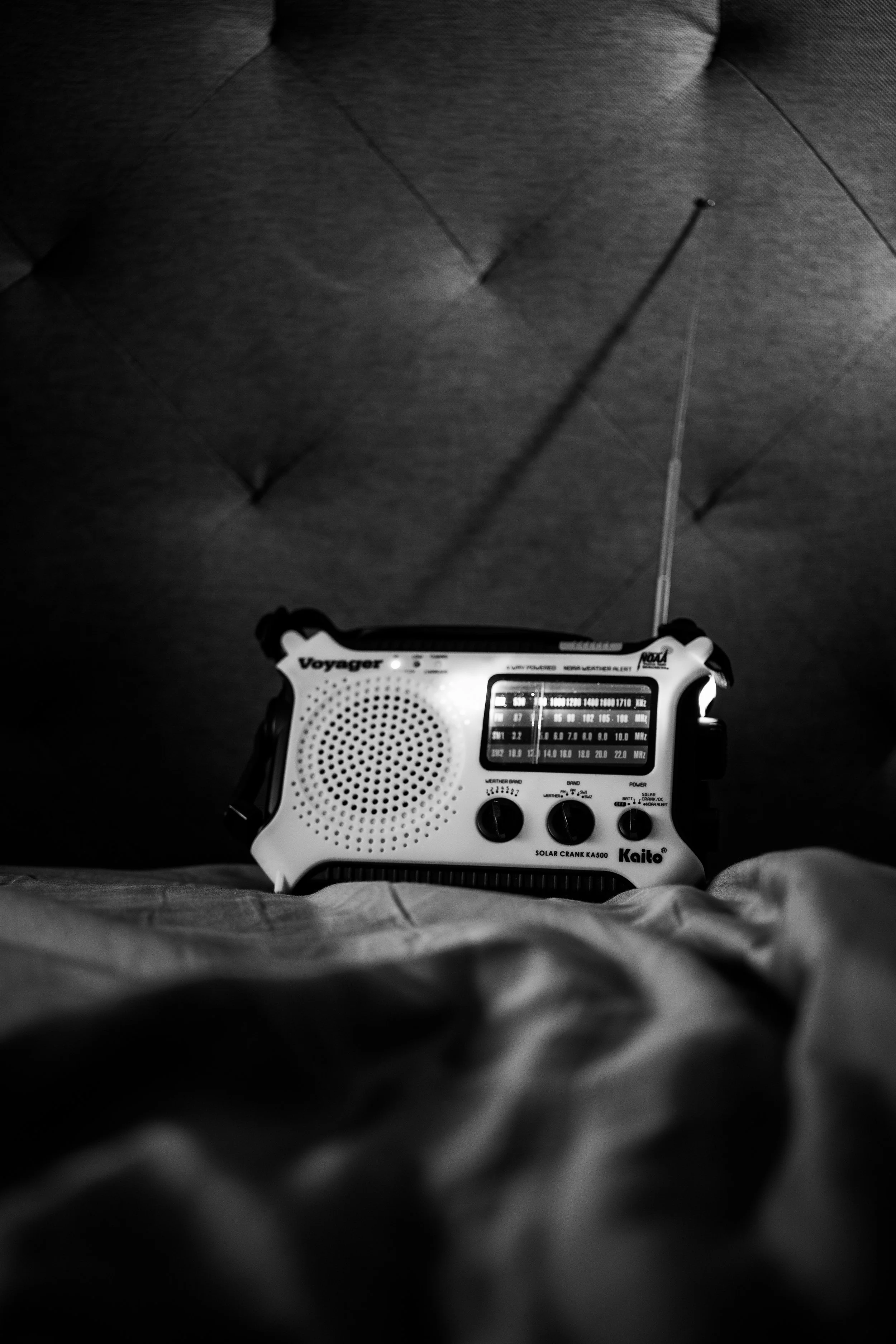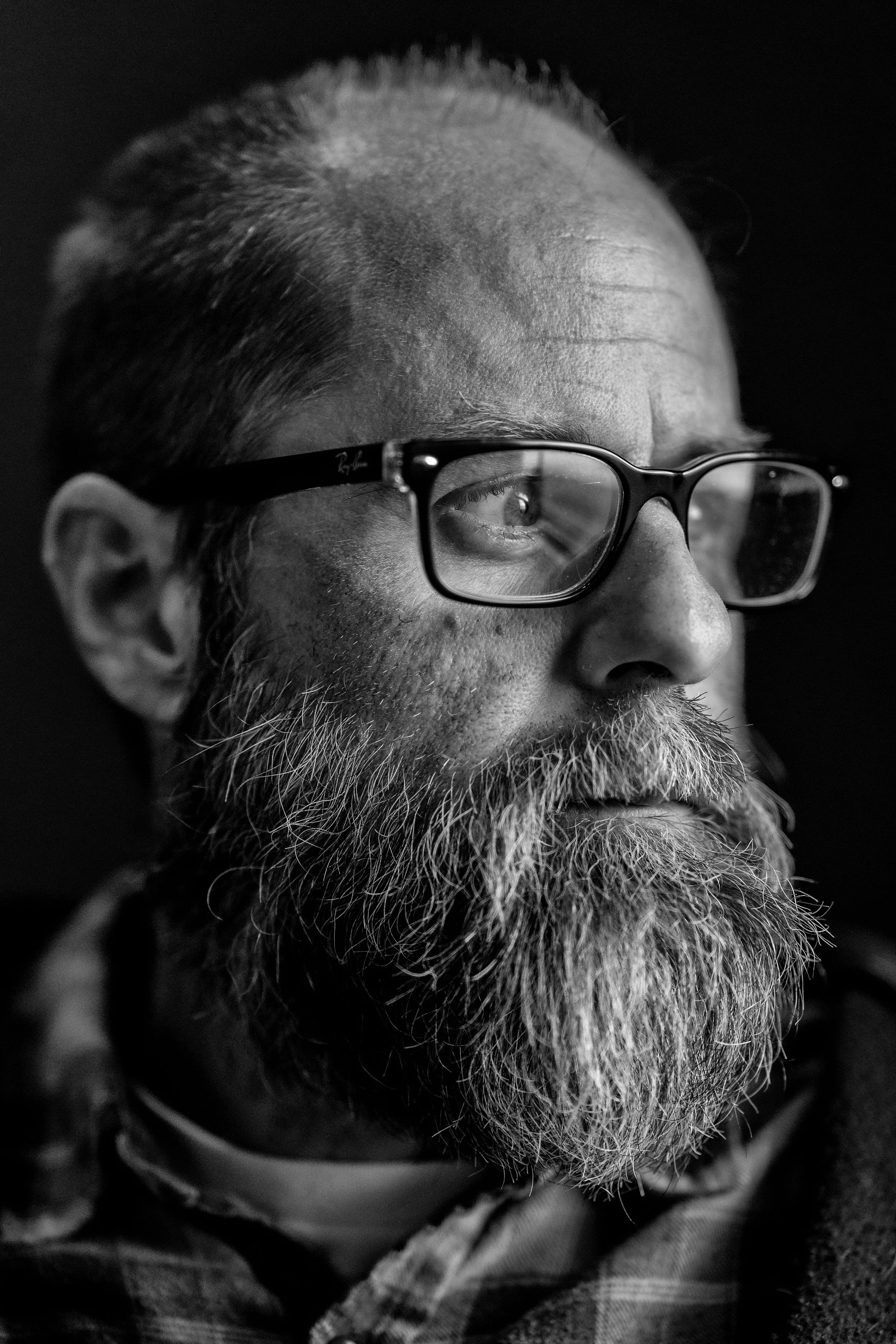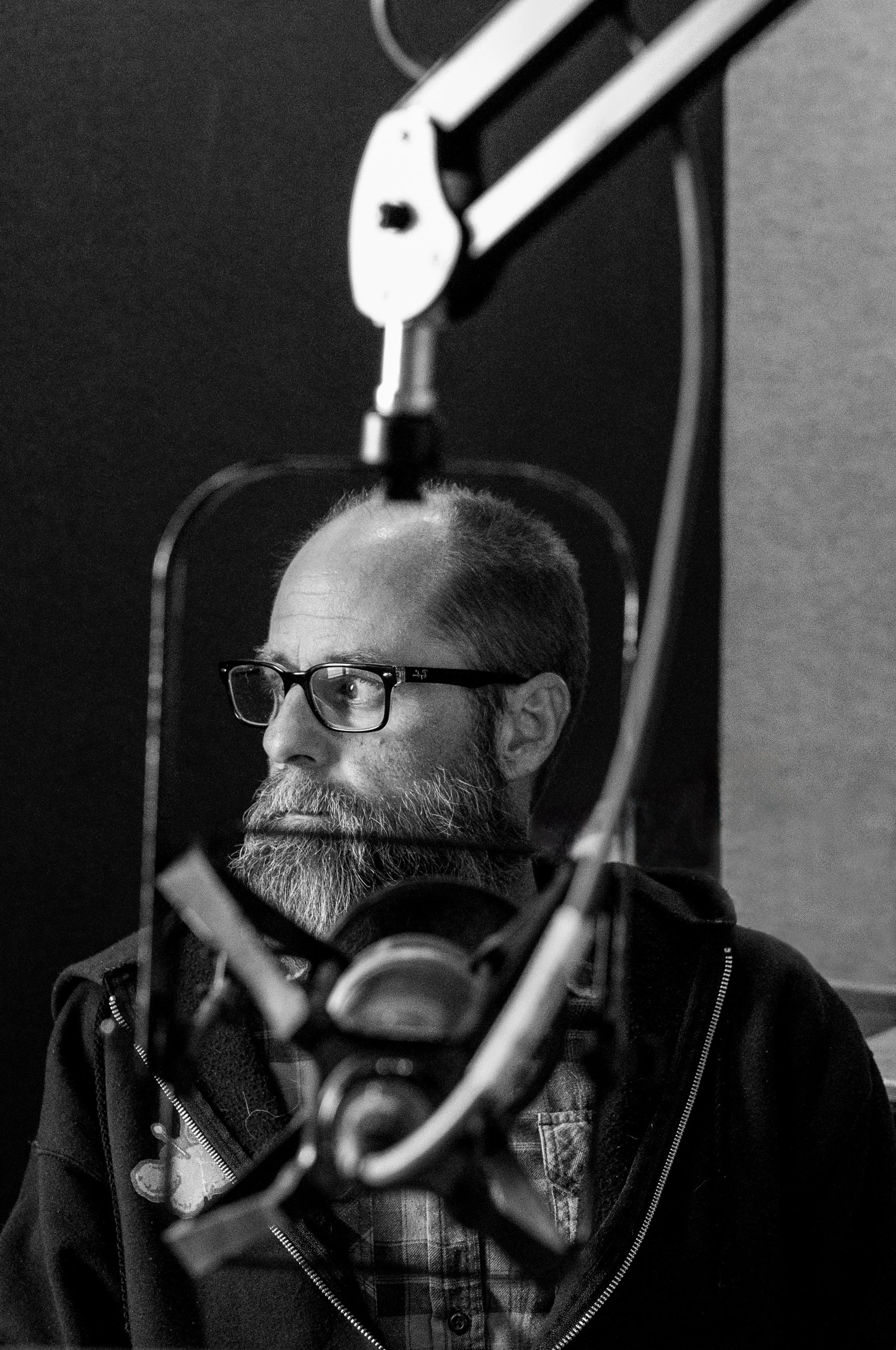Purpose Calling: How a Thousand-Year Storm Awakened a Community's Voice
A Purpose Portrait featuring Mark Starling, Morning Show Host/News Director at iHeartMedia Asheville
Mark Starling holding the emergency radio which kept me company through the long days and nights of Hurricane Helene. © Brody Hartman
The Storm That Changed Everything
On September 26 and 27, Hurricane Helene poured a historic 43 trillion gallons of water on Western North Carolina, the equivalent of Lake Tahoe releasing in 36 hours.
Entire communities—Asheville, Swannanoa, Chimney Rock, Bat Cave, Lake Lure, and many others — were devastated, with some neighborhoods disappearing off the map. Landslides tore through forests, over a thousand bridges were washed out, and roads simply vanished, leading to an estimated $53 billion in damages across the state. With power, internet, and cell service down, most of us in Western North Carolina were isolated, left to face only what we could see in our immediate impact zone.
A Voice in the Darkness
On September 27, two miles from hard-hit Swannanoa, my family and I huddled in our Asheville home, watching massive trees fall, rivers of runoff pouring through our garden and fields, and relentless rain beating down on our metal roof. Amid the chaos, I remembered a hand-crank emergency radio tucked in my car. As night fell, desperate for news, I tuned in to WWNC iHeart Radio Asheville, a local station that had become a beacon of hope in the storm. There, I found Mark Starling’s honey-toned voice—a comforting lifeline in the storm.
Mark and his producer, Tank Spencer, were trapped at the station, broadcasting hour after hour as the only link to the outside world. With power, internet, and cell service down across much of Western North Carolina, Mark's team became an impromptu 24-hour command center, offering critical updates and sharing stories of heroism and heartbreak.
Weeks later, I reached out to thank Mark for being a voice of humanity in the dark on those long days and nights. Yet even then, I felt what I’d heard on the radio was more than just reporting—it was purpose unfolding. As a Purpose Guide, I’ve witnessed how crises bring people to the edge of life’s bigger questions—questions of meaning, contribution, and service—while also revealing hidden talents and passions left on the back burner. These moments often lead to a deeper alignment with purpose and what matters most.
I reached out again, inviting Mark to share his story for Portraits of Purpose. What follows is the story of how a seasoned broadcaster discovered a deeper calling, inspiring a community to find their own in the face of catastrophic loss.
Mark Starling and the iHeartMedia satellite. © Brody Hartman
Emergency radio which kept our family informed and connected to our communities throughout the first weeks of the storm. © Brody Hartman
Finding His Voice: Mark's Journey to Asheville
Mark's journey to Asheville and his role as News Director at iHeart Radio was shaped by years of honing his voice, even as he grappled with where he belonged in the world of radio. After covering intense news and multiple hurricanes in Florida, Mark began to feel the toll of daily hard news.
"I was tired of choosing which murder to make my lead story every morning," he reflected. "Street reporting just wasn't where my heart was." While he valued keeping people informed, Mark felt a pull toward connecting with listeners more authentically.
His journey took him through various roles across the country. After years covering hurricanes in Florida, he moved to Ithaca, New York, hoping to make a fresh start at a classic rock station. But the role quickly felt too restrictive, leading him back into the news in Harrisonburg, Virginia. Burned out, he left radio entirely, only to return to the airwaves six months later, covering news for multiple markets in Tampa. During these years, he honed his skills in hurricane coverage, navigating over 25 major storms, including Hurricane Frances in 2004 and a relentless 2005 season when three hurricanes struck within six weeks.
Reflecting on that time, he recalled, "I think that was the storm where I spent the night riding it out in a van on the side of an overpass," laughing at his younger self's determination to prove he could handle the chaos. "This was totally irresponsible, but I had to show them I could do it."
When he landed an opportunity as lead news anchor in Orlando, he took a leap despite feeling unqualified. The station's management appreciated his frank, conversational approach that bypassed the formality typical of news delivery.
"I think people respond to realness. My station in Orlando didn't want the standard 'news voice.' They just wanted me to talk like I talk, and that's what connected with people," he shared, acknowledging how he'd started to discover the power of his authentic voice. Reflecting on his journey, he noted, "I'd always felt a little out of place in radio, like my way of talking wasn't quite what news wanted. But I realized that my voice, my real voice, was what people connected to. And when I trusted that, it made all the difference."
Finally, after a visit from his mother in 2015, he felt compelled to look for a job closer to family and to put down some roots. Asheville appeared at the top of his search, and he took a chance, moving there that March. In Asheville, he found a balance, bringing a human touch to news while remaining grounded in authenticity, humor, and service to the community.
“I’d always felt a little out of place in radio, like my way of talking wasn’t quite what news wanted. But I realized that my voice, my real voice, was what people connected to. And when I trusted that, it made all the difference.”
Mark Starling Morning Show Host/News Director at iHeartMedia Asheville © Brody Hartman
When Crisis Calls
When Hurricane Helene approached, Mark and his producer, Tank Spencer, planned for a marathon broadcast. With the ominous warning from his meteorologist that “this is going to be catastrophic,” they prepared for something big. His wife, who was in Black Mountain, initially refused to evacuate, saying, “If water comes in the house, I’ll get the dogs, and we’ll get on top of the dining room table and ride it out.” But by Friday morning, she called, saying roads around them were flooding, and evacuated.
On Saturday, all cell phones went down. “A buddy of mine realized, ‘I gotta get these guys a ham radio, because that’s the only way they’re gonna be able to get information.’ So he hiked in with a handheld ham radio and said, ‘The ham radio operators network is ready for you. All you need to do is just key it up and ask for whatever you need.’” They were now the only source of information: “TV was out, internet was done, cell phones were done. There was nothing—just radio.”
Then, colleagues from Atlanta hiked in with a Starlink unit strapped to their backs, restoring limited internet and allowing for 24/7 coverage.
Soon after, Mark and Tank received a call that would leave a lasting impact. Michael Drye was trapped on the second floor of his home with his wife and grandson. Mark did his best to keep them calm, reassuring them on air. "We can get people over to you," he told Michael, who replied, "We're okay. We've been through this kind of flooding before." Tragically, Mark later learned that the family's house was swept away, and all three perished. Reflecting on the call, Mark acknowledged, "It was a game changer—a reminder of just how serious this was."
From that moment, Mark and Tank knew their role had shifted beyond broadcasting. They became a lifeline for those feeling isolated and afraid, and with every broadcast, they provided vital updates and reassured listeners that they weren't alone. "We knew we had to make people think we were in control," Mark explained, "even if we didn't feel that way ourselves."
“This is going to be catastrophic. I never heard our meteorologist use that language before.”
Mark Starling Morning Show Host/News Director at iHeartMedia Asheville © Brody Hartman
Mark Starling Morning Show Host/News Director at iHeartMedia Asheville © Brody Hartman
A Community Finds Its Purpose
What began as storm coverage turned into a round-the-clock operation connecting residents with life-saving resources. The iHeart team worked tirelessly—Tank Spencer, Eddie Fox, Amanda Fox, Josh Michael, Ariel Rymer, Brian Hall, and Jeremy Greene—fielding calls from people trapped, searching for loved ones, or in need of help. Mark often slept just a few hours before resuming his shifts.
The broadcasts inspired others to act. Chris Henderson, a local flooring company owner, began noting names and addresses of missing people he heard on air. His team soon reunited 22 families and located over 435 people. “He finally got a call through to us,” Mark shared, “and said, ‘If you guys can provide me with the lists, I’ll have my teams go out.’” As word spread, more volunteers joined, eventually providing regular wellness checks and medical support.
Similarly, the Chainsaw Brothers—led by Coley Duffie, a local tow truck driver—responded to the devastation by offering to help clear trees off homes. Unable to work his regular job, Coley began listening to Mark's broadcast and realized he had the tools and friends to help. Within days, the group had become known for their work in the hardest-hit areas. Eventually, they even formalized their efforts, securing a bucket truck and becoming licensed, insured, and bonded, but continued to operate with fairness and compassion. Mark noted, "People were being quoted $27,000 to remove a tree from their homes, and these guys showed up and said, 'We'll do it for $3,000—or we'll figure it out if you can't pay.”
Post-it notes displaying essential rescue and recovery information which were posted on the team’s broadcasting computers to share with callers and listeners. © Brody Hartman
Broadcasting the Heart of the Storm
During the storm, emotions ran high, revealing the vulnerability and strength of those at the station. Mark and his team took turns, allowing themselves five-minute breakdowns before regrouping. "We weren't afraid to say we were scared, and we weren't afraid to cry," Mark shared. "Everybody was on a rotation. Everyone took their five minutes to have a mental breakdown every hour or every other hour, and then you'd get something to eat or drink and get it back together again." He reflected on his team's dedication and said, "There's really nothing this team can't do."
The storm also dissolved social barriers, uniting people across differences. "This storm made people realize it really doesn't matter who you vote for, what God you believe in, or where you come from," Mark noted. "Everybody came together." Mark recalled how listeners reached out to help one another, like the caller who said, "I helped every single one of my neighbors, and I haven't even asked who they voted for first." The raw emotions, the tears, and the collective resilience underscored the strength of a team and the unifying power of community when crisis calls.
“This storm made people realize it really doesn’t matter who you vote for, what God you believe in, or where you come from,” Mark observed. “Everybody came together.”
What’s Calling Now?
Reflecting on the storm, Mark feels a renewed sense of purpose in his work. “I think I love my job a little more now. I see the purpose in it more.” During the storm, radio offered something unique—a real connection. “We weren’t competing with cable news or social media—people didn’t have access to it,” he said. With no internet or news streams fueling fear, listeners turned to radio for comfort. “People called us even after their internet was back,” Mark said. “They weren’t interested in social media or Netflix. Radio offered something different—something that helped them feel better.”
He noted how quickly things returned to old patterns, though. “You can almost watch the slide from the minute people got access back to social media. It took about five days before they were back to ‘You’re the Antichrist, You’re a Nazi, you’re this, you’re that,’” he lamented. “Guys, no, this is not what we’ve been working towards since this storm moved out of the area.”
Since then, Mark's purpose has expanded beyond just being a voice on the airwaves. Now, he's focused on helping his community recover. "We helped a lot of people during the storm, but there's still so much need, especially among local businesses," he said. Recently, he's hosted a Western North Carolina Business Roundtable, bringing business owners who lost everything together to directly share their needs. "I need you to tell me what you need because I can't help you if I don't know what to look for," he told them.
Through these efforts, Mark and his station are leveraging community connections to bring around $3 million in grant money to local businesses.
“People called us even after their internet was back. They weren’t interested in social media or Netflix. Radio offered something different—something that helped them feel better.”
"I think I just kind of take things a little bit less for granted now. I see the purpose for the job a little bit more than I did.”
Mark Starling Morning Show Host/News Director at iHeartMedia Asheville © Brody Hartman
"I think people's purpose is to feel like they are actually making a contribution to something. And it may just be something very minuscule, but it's a contribution.
Mark Starling and the iHeartMedia satellite used during the storm to broadcast critical updates. © Brody Hartman
Reflections on Mark’s Experience
Sometimes we actively seek our purpose, exploring possibilities and testing paths forward. But there are moments when purpose finds us instead - emerging unexpectedly through crisis, challenge, or synchronicity. Mark Starling's story reveals how Hurricane Helene became such a catalyst, not just for him but for an entire community. Through this lens, we can see how purpose manifests on many levels:
All Our Life Experiences Matter and Shape Our Purposeful Path in the World
Mark has covered over 25 hurricanes in the past, though he never thought he would use that experience in Asheville.
Crisis revealed deeper meaning in his role as a broadcaster
Purpose is Primarily About Authenticity and Alignment
There is little that separates Mark’s internal voice of authenticity and the one he broadcasts on air.
Authenticity is magnetic and catalytic.
Organizational Purpose Transformed
iHeart Radio redefined traditional broadcasting to become a community lifeline.
Technology limitations paradoxically strengthened human connections.
The team discovered their extraordinary capabilities under pressure—personally and collectively.
Ingenuity and innovation emerge from chaos and complexity.
Simple tools (radio, a post-it dashboard, ham radios) enabled profound community connection.
Community Purpose Awakened
The crisis dissolved social barriers, revealing shared humanity.
Ordinary citizens like the "Minutemen" and "Chainsaw Brothers" were called to their purpose by a crisis that activated their care and compassion for the community.









